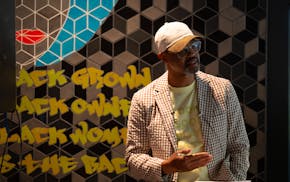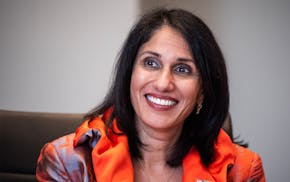After a presidential campaign soaked in messages of fear and division, this holiday season is a good time to read a book about finding common ground.
Civil rights lawyer john a. powell, also a University of California professor with deep connections to Minnesota, last week published his second book of 2024 on connecting over the topics that most divide us, like politics, race and economics. He calls such work "bridging."
"What bridging says is, 'Let's take the time to be curious about each other,'" said powell, who spells his name in lowercase letters to signify oneness, rather than dominance, in the universe. "It's not saying we agree with each other. It's not even saying we like each other. It's saying it's basic human dignity to have curiosity. We're trying to see each other's humanity."
Though he's a professor in Berkeley today, powell has been an influential voice in the Twin Cities civil rights scene since the 1980s.
Early in his career, the University of Minnesota funded his research and consulting work in Africa. He later taught at the U's Law School and still regularly visits the community as board member of the McKnight Foundation. It embraced some of his ideas by anchoring the Groundbreak Coalition, the largest privately funded effort in Minnesota to close racial disparities.
"One reason I joined the board at McKnight is, what they're doing with Groundbreak is important for Minnesota and for the country," powell said. "I think Minnesota is a wonderful place and a place where you can experiment. Sometimes you need to experiment. Something looks good on paper and you need to see it play out in reality."
This summer, powell weighed in on a controversy that divided proponents of affordable housing in Minnesota. At issue was whether a panel advising the U.S. Commission on Civil Rights should include a Minneapolis minister's full criticism in a report on the state's compliance with federal fair housing rules. powell argued in thunderous language in a 15-page memo that it should. Ultimately, the panel did not.
That squabble brought attention to a long-simmering debate over whether subsidized housing for the poor should be spread throughout the metro area or concentrated in Minneapolis and St. Paul.
In August, I wrote about the persistence of that fight in the context of the fact that Minnesota's economic development is tied more than ever to the economic success of its residents of color. I landed on the side of building throughout the metro, thinking that's better for both cost reasons and for preventing segregation.
That's powell's view, too, though he said he can see why people who argue for building in poor neighborhoods in the two cities want opportunities created in them, though without displacing people through gentrification.
"I've agreed to talk to, maybe even bridge, the two sides," he said. "I think I have some social capital with both people who are insisting that the problem is gentrification and people insisting the problem is segregation."
In our conversation, he reiterated his often-expressed view that such fights arise because the U.S. didn't ever achieve integration, despite the civil rights movement of the 1960s and even though many Americans think it did.
"The federal government basically walked away from it and has never really had a fully thought-out plan for integrating housing or schools," powell said. "And so you get people who are apparently on the same side, liberal or progressive, arguing about self-determination and the rights of Black people to stay where they are and those who argue for integration that now seems quaint given where we are with the country."
powell's new book, "The Power of Bridging: How to Build a World Where We All Belong," is more instructional and practical than some of his previous ones. It's a guide to action based on an idea that some will see as a criticism of past efforts to create equity or equality in society.
Those efforts too often assume the dominant or better-off group in a community has everything it needs, and the goal wrongly becomes to get the marginalized group to where the dominant one is. He told me about an effort in Oregon to close a gap in the number of suicides by Black men, which was high, and white men, which was lower.
"As things would happen, the gap largely closed but not because Blacks were killing themselves less but because whites were killing themselves more," he said. "You could say the goal was met and close shop. But people said, 'What we meant was trying to reduce the suicide deaths in the Black community and the white community.' Well, that didn't get said quite clearly."
Powell promotes a different way of thinking he calls "targeted universalism." It begins with the notion that all groups ultimately have the same, or universal, goal. Everyone is trying to get to the same place regardless of what anyone already has.
"It may be higher, or harder to reach, in some communities than in some other communities and so you may need different strategies," powell said. "But the goal is universal and the strategy is targeted based on how groups are situated."
With that explanation, powell put to words something I had difficulty expressing this summer and fall in columns about race and money in Minnesota. In some, I concluded Minnesota could not remedy past unfairness to, for instance, Black Minnesotans in a way that is fair to everyone. That led some readers to push back, saying it's not right to create unfair policies today because of unfairness yesterday.
powell often hears that, and here's his counterargument:
"I use the example, I have three kids and one of them has strep throat, one of them has a stomach virus and the other is fine. I don't go to the doctor and get medicine for them equally," he said. "The goal is for all of them to have optimum health. That goal doesn't shift from kid to kid. How you reach it does."

Ramstad: Minneapolis' Camden neighborhood is rising. Houston White wants to keep it that way.

Ramstad: Minnesota's big businesses are in crisis with a common problem

Ramstad: No business can 'eat' all the tariffs, not even Walmart

Ramstad: Donaldson is protected from tariff chaos after expanding globally the right way


